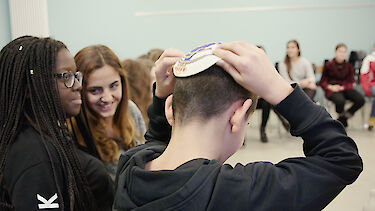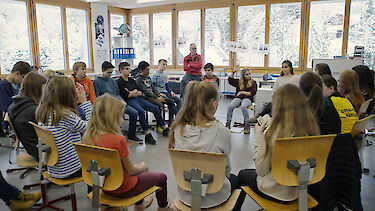
Likrat for Schools – breaking down prejudice through dialogue
Young Jewish people visit classes of schoolchildren as part of the Likrat project. This enables pupils to engage directly with Judaism at a personal level. Antisemitic and racist prejudices are broken down through dialogue.
In Switzerland, many schoolchildren know very little about Judaism and its traditions, culture and diversity. Many have never even met a Jewish person in real life, let alone had a conversation with one. Unfortunately, what they think they know is often rife with misunderstandings and prejudice. That’s where the Likrat dialogue and education project comes in. Young Jewish people, called Likratinas and Likratinos, visit classes of schoolchildren to present Judaism and answer any questions that the pupils may have. The basic principle behind any Likrat encounter is that all questions are allowed – nothing is off bounds.

Coming together and breaking down prejudice
‘Likrat’ is a Hebrew word that means ‘coming together’. Jewish and non-Jewish children and young people need to have that contact. The Likrat approach, which is based on peer-to-peer education, gives Judaism a proper face. The fact that the visitors are close in age to the participants creates a sense of closeness and facilitates dialogue on an equal footing. The Likratinas and Likratinos use objects from Jewish tradition and the stories that go with them to bring Judaism to life for schoolchildren. This helps schoolchildren to absorb the content and leads to more successful learning outcomes. Likrat aims to create mutual understanding, emphasise the things we have in common, and dismantle antisemitic and racist prejudices and stereotypes. This approach is ideal for sharing intercultural and interfaith experiences and promoting tolerance and dialogue in a sustainable and effective way.
Likrat has been running in German-speaking Switzerland since 2002 and in French-speaking Switzerland since 2015. During this time, the number of meetings has steadily increased. Today, there are over 150 meetings per year, reaching over 3 300 pupils.

Likrat encounters
Likrat is aimed at schoolchildren in years 4 to 6 of primary school, and at middle and secondary schools. A Likrat encounter lasts the equivalent of two school lessons and costs CHF 120. The Likratinos and Likratinas are usually between 15 and 18 years old. Young Jewish people train to become Likratinas and Likratinos every year. They attend a number of seminars to gain a deeper understanding of their religion and learn to give quick answers to penetrating questions. They are trained to put the content across using age-appropriate language. Besides knowledge transfer and rhetoric, the focus is on simulating encounters, so as to prepare the young people as well as possible for their future Likrat encounters. Likratinas and Likratinos represent the broad spectrum of the Jewish faith.
In order for the sessions to be as successful as possible, we recommend preparing schoolchildren for the Likrat encounter in advance. It could form part of a larger series of lessons on Judaism, for instance. The pupils can think of questions to ask the Likratinas and Likratinos beforehand.
New offer for teachers
We are now offering every teacher who books a Likrat meeting an individual coaching session before or after the meeting, if possible with a pedagogically trained specialist from the Likrat team. Please indicate whether you are interested in such a meeting when you register. This offer is free of charge for you.
Of course, teachers who have not planned a Likrat meeting can also register for a coaching session on the topic of Judaism and antisemitism. Please send us a message to info@likrat.ch so that we can get in touch with you.
-
Sound interesting?
-
Book Likrat for Schools now
For any enquiries, drop us a line at schools@likrat.ch or give us a call on +41 43 305 07 65.
-
Documentary: ‘Likrat – the film’
As part of a Likrat encounter, Jewish young people visited a class of schoolchildren in the Zurich Oberland and talked to the pupils about their experience of being Jewish. For the very first time, they were accompanied by a film crew.

Topics



